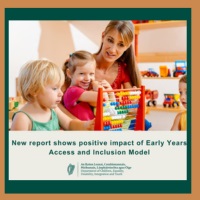From Department of Children, Equality, Disability, Integration and Youth
Published on 19 January 2024 
Last updated on 19 January 2024
- Access and Inclusion Model (AIM) ensures children with a disability can access and participate in the Early Childhood Care and Education (ECCE)
- 82% of parents reported that AIM has benefited their child
- 69% of parents reported that AIM has supported their child’s interaction with their peers and their child’s meaningful participation in pre-school
- Approximately 95% of providers reported that AIM was having a positive impact on children with a disability and on inclusion in their pre-school setting.
The Minister for Children, Equality, Disability, Integration and Youth, Roderic O’Gorman today published the findings from an independent evaluation of the Access and Inclusion Model (AIM).
AIM is a multi-agency initiative led by the Department of Children, Equality, Disability, Integration and Youth (DCEDIY) that offers a suite of supports – both universal and targeted - to ensure children with a disability can access and meaningfully participate in the Early Childhood Care and Education (ECCE) programme in mainstream settings.
Since AIM was first launched in 2016, more than 27,000 children have received targeted AIM supports in over 4,400 settings nationally and many more children have benefited from its universal supports. AIM has also been recognised nationally and globally - winning awards for excellence in practice and inclusion.
The independent evaluation, undertaken by the University of Derby, involved almost 2,000 stakeholders – parents, educators, providers and representative groups. The findings from the evaluation were overwhelmingly positive and stakeholder support to extend AIM beyond the ECCE programme was unanimous.
- 82% of parents reported that AIM has benefited their child; and
- 69% of parents reported that AIM has supported their child’s interaction with their peer and their child’s meaningful participation in pre-school.
One parent participating in the evaluation said:
‘AIM has given my daughter a chance to attend pre-school like her peers. Even though she has obstacles in her way, she is overcoming these and hitting new milestones every day. AIM was the best thing to happen to us’.
- 94% of providers reported that AIM was having a positive impact on children with a disability; and
- 96% of providers reported that AIM was having a positive impact on inclusion in their pre-school setting.
The report also describes how AIM is improving professional practice and increasing the capacity of, and confidence, among educators to support children with a disability in mainstream pre-school.
One provider participating in the evaluation said:
‘We have been able to do so much more for the children in our pre-school than we would have been able to if we did not have access to the training, early years specialist support or the higher capitation that AIM provides’.
The findings from the evaluation has already informed the phased extension of AIM announced in Budget 2024, specifically the extension of targeted AIM supports to ECCE-age children beyond time they spend in the ECCE programme – both in term and out.
In addition to this, an action plan has been developed to respond to areas for improvement, including increasing awareness of AIM, further building the capacity and confidence of educators and providers in supporting children with autism and streamlining the application process for equipment, appliances, and minor alterations.
Minister O’Gorman said:
“Every child should have access to high quality early learning and care. The findings from the evaluation published today show the enormous difference AIM is making to the lives of children with a disability - removing barriers to accessing and participating in mainstream pre-school with their peers.
“The extension of AIM, which I announced as part of Budget 2024, informed by the findings from this evaluation, will bring further benefits to these children.
“This extension is among a suite of actions officials in my Department are taking to ensure we continue to build on the success of AIM to ensure, going forward, AIM works in the best interest of all children and families.”
Notes
The First 5 Strategy commits, inter alia, to ‘undertake an end-of-year three evaluation of AIM, and subject to evaluation findings and other relevant developments, consider enhancements to and/or extension of AIM to, for example, early learning and care services: all school-age childcare services and/or to children with needs other than a disability.’
The evaluation was commissioned by this Department and was delayed due to Covid-19. The evaluation was led by the University of Derby (UoD) consortium and took place between December 2020 and December 2021.
In Budget 2024, an additional €14m was allocated to AIM. €7m of this allocation will support the increasing cohort of children with a disability requiring AIM supports to access and meaningfully participate in the ECCE programme. An additional €7m provides for an expansion of targeted AIM supports to these children beyond time spent in the ECCE programme, in term and out of term from next September 2024.
